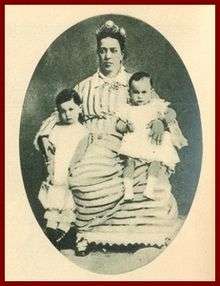Shafaq Nur Hanim
Shafaq Nur Hanim (Arabic: شفق نور هانم; Turkish: Şefeknur Hanım; died 17 March 1884) was the Princess consort of Khedive Isma'il Pasha and was Walida Pasha to their son Tewfik Pasha, the next Khedive of Egypt and Sudan.
| Shafaq Nur Hanim شفق نور ھانم | |||||
|---|---|---|---|---|---|
 | |||||
| Walida Pasha of Egypt | |||||
| Tenure | 26 June 1879 – 17 March 1884 | ||||
| Predecessor | Hoshiyar Qadin | ||||
| Successor | Emina Ilhamy | ||||
| Died | 17 March 1884 Kasr al-'Ali Palace, Cairo, Egypt | ||||
| Burial | |||||
| Spouse | Isma'il Pasha | ||||
| Issue | Tewfik Pasha | ||||
| |||||
| House | House of Muhammad Ali (by marriage) | ||||
| Religion | Sunni Islam | ||||
Early years
Shafaq Nur Hanim had been a servant in the household of Ismail's mother Hoshiyar Qadin. When Ismail was about twenty years old, his mother presented him with Shafaq Nur. He began his sexual activity under the watchful eye of his mother. Shafaq Nur gave birth to his second child, and his first surviving son, Tewfik Pasha on 30 April 1852 at the Qasr al-Maniyal Palace. Although Ismail had married the first three princesses ahead of Shafaq Nur, she undoubtedly had high standing in his harem as the mother of his oldest son and as a former member of his mother's household.
She was often referred to in the sources as "Walida" or "Mother". In 1866, fourteen years after Tewfik's birth, Ismail married Shafaq Nur as the Egyptian law required to marry the mother of the heir apparent, and elevated her to the position of the "Fourth Princess". Not long after, she and her son established a separate residence in al-Qubba Palace.[1][2] She took her due place with the other wives of Ismail Pasha on all state occasions.[3]
As Walida Pasha
Ismail was deposed by the Sultan of Turkey acting on the advice of the European powers, 26 June 1879, and his son became the Khedive and Shafaq Nur became the Walida Pasha. Shafak Nur exerted considerable influence on him emerging as his staunch defender as the royal family split on the 'Urabi revolution. Alexander Meyrick Broadley, the British lawyer who defender general 'Urabi, described the way she subjected the princesses of the royal family who supported the leader of the revolution to a tongue lashing for their disloyalty and promising to severely punish them.[4]
Death
Shafaq Nur Hanim died at the Kasr al-'Ali Palace on 17 March 1884, and was buried there at the Khedival Mausoleum, Al-Rifa'i Mosque, Cairo.[5]
References
- Cuno, Kenneth M. (April 1, 2015). Modernizing Marriage: Family, Ideology, and Law in Nineteenth- and Early Twentieth-Century Egypt. Syracuse University Press. pp. 33–4. ISBN 978-0-815-65316-5.
- Doumani, Beshara (February 1, 2012). Family History in the Middle East: Household, Property, and Gender. SUNY Press. p. 258. ISBN 978-0-791-48707-5.
- Chennells, Ellen (November 20, 2014). Recollections of an Egyptian Princess by Her English Governess: (1871-1876, New Intro, Annotated). BIG BYTE BOOKS.
- Hatem, Mervat F. (April 12, 2011). Literature, Gender, and Nation-Building in Nineteenth-Century Egypt: The Life and Works of `A'isha Taymur. Palgrave Macmillan. p. 88. ISBN 978-0-230-11860-7.
- His Highness Hidiv Ismail Paşa Hidiv of Misir (Egypt), Sudan and Taşoz
External links
- Soszynski, Henry. "Walida". Ancestry.com, Inc. Retrieved 2010-02-27.
| Egyptian royalty | ||
|---|---|---|
| Preceded by Hoshiyar Qadin |
Walida Pasha of Egypt 26 June 1879 - 17 March 1884 |
Succeeded by Emina Ilhamy |